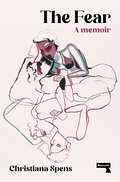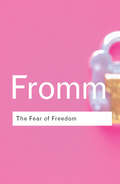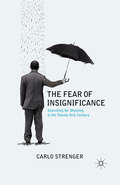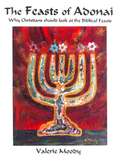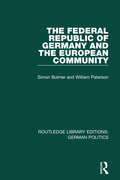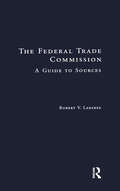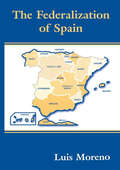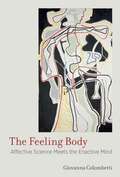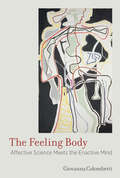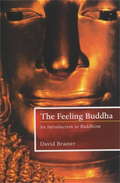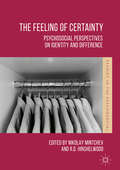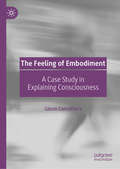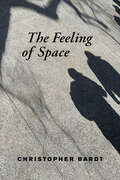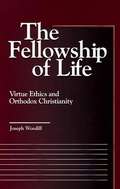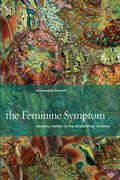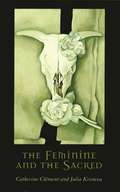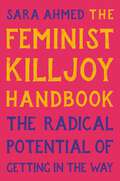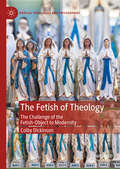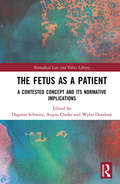- Table View
- List View
The Fear
by Christiana SpensA philosophical memoir about the deepest and most primal of human emotions, how it controls us all, and how we try to control one another when the stakes are so high.The Fear is a book about what scares us the most, how we live with these threats, and the emotional turmoil they inspire.From gas-lighting to terrorism, and from scapegoating to psychoanalysis, The Fear stares deep into the abyss, searching for the monsters, horrors and spectres that destabilise and haunt us, and finding out what these fears—and how we respond to them—shape us as people and societies.The Fear is a personal and critical exploration of fear and its impact in public and private lives, revealing how our cultural landscape informs and even justifies the way we relate to one another, and how it can set us free. Combining memoir with philosophical reflection on terrorism, psychology, relationships and culture, The Fear is a multi-faceted and poetic response to a subject that plagues us all.
The Fear of Freedom (Routledge Classics)
by Erich FrommErich Fromm sees right to the heart of our contradictory needs for community and for freedom like no other writer before or since. In Fear of Freedom, Fromm warns that the price of community is indeed high, and it is the individual who pays. Fascism and authoritarianism may seem like receding shadows for some, but are cruel realities for many. Erich Fromm leaves a valuable and original legacy to his readers - a vastly increased understanding of the human character in relation to society. At the beginning of the 21st century, it is more important than ever to be aware of his powerful message. Listen, and take heed.
The Fear of Insignificance: Searching for Meaning in the Twenty-First Century
by C. StrengerThis book shows how, after the fall of the Berlin Wall in 1989, the Gospel of the free market became the only world-religion of universal validity. The belief that all value needs to be quantifiable was extended to human beings, whose value became dependent on their rating on the various ranking-scales in the global infotainment system.
The Feasts of Adonai: Why Christians Should Look at the Biblical Feasts
by Valerie MoodyThis book is comprehensive, yet easy to understand. It is complete with a Glossary and Bibliography. Charts include a brief history of the Temple, Eastern Gate in Prophecy, Elements of Fasting, Feast Calendar, Feast Days in the Old and New Testaments, Four Judgment Days, Gematria, Hallel, Hebrew Culture vs. Greek Culture, Hebrew names for days of the week, How to pray for Israel, Jewish Calendar explained, complete list of Hametz, Megillah explained, Sabbath, New Moon, Messianic Passover Seder, Messianic Significance of the Feasts, Mezuzah, Mikvah, Seven Species of Israel, Tefillin, Thirteen Merciful Attributes of God, Tikkun Olam, Torah Reading Schedule and guideline, recipes and menus for every festival.
The Federal Design Dilemma
by Clouser Mccann Pamela J.The level of government responsible for implementing policies affects intent, services provided, and ultimate outcomes. The decision about where to locate such responsibility is the federal design dilemma faced by Congress. Taking a new approach to this delegation and decentralization, The Federal Design Dilemma focuses on individual members of Congress. Not only are these legislators elected by constituents from their states, they also consider the outcomes that will result from state-level versus national executive branch implementation of policies. Here, Pamela J. Clouser McCann documents congressional intergovernmental delegation between 1973 and 2010, and how individual legislators voted on decentralization and centralization choices. Clouser McCann traces the path of the Affordable Care Act from legislative proposals in each chamber to its final enactment, focusing on how legislators wrestled with their own intergovernmental context and the federal design of health insurance reform in the face of political challenges.
The Federal Republic of Germany and the European Community (Routledge Library Editions: German Politics)
by Simon Bulmer William PatersonOriginally published in 1987, this book examines German governmental policy from 1969-1986 and explains this in terms of the political, economic and administrative dynamics of the (then) Federal Republic. The study includes analysis of the attitudes and the role of West German interest groups, political parties, public opinion, the legislature and the federal states regarding European policy. The book is based on extensive interviews as well as the authors’ familiarity with the institutions and key players involved. It will appeal to students of German politics, the EU and international relations.
The Federal Trade Commission: A Guide to Sources (Research and Information Guides in Business, Industry and Economic Institutions)
by Robert V. LarabeeThis annotated bibliography assists the reader in locating information about the United States Federal Trade Commission. The book is divided into four chapters, each reflecting the major functions and regulatory responsibilities of the FTC.
The Federalist
by Alexander Hamilton James Madison John Jay J. R. PoleNo competing edition of The Federalist offers nearly as much help in grasping Publius' arguments in defense of the new but unratified United States Constitution of 1787 as this new annotated edition by J. R. Pole. Essay by essay--with ample cross-references and glosses on 18th-century linguistic usage--Pole's commentary lays bare the intellectual background and assumptions of Alexander Hamilton, James Madison, and John Jay; explicates and critiques The Federalist's central concepts, rhetorical strategies, and arguments; and points up the international, national, and local facts on the ground relevant to Confederation Era New Yorkers, the constituency to which The Federalist was originally addressed.Pole's Introduction, a brief chronology of political events from 1688 to 1791, a brief overview of the themes of the essays, the text of the Constitution cross-referenced to The Federalist, and an index of proper names, concepts, and themes that also functions as a glossary further distinguish this edition.
The Federalist
by Jacob E. CookeThis edition from a noted historian &“is the first definitive, variorum edition of the text of this much reprinted classic&” (The William and Mary Quarterly). The definitive edition of the historic essays by Alexander Hamilton, James Madison, and John Jay, fully annotated and reproduced from the original text. Also included are a new introduction by historian Jacob C. Cooke, along with notes, a glossary, as well as the complete Articles of Confederation, Declaration of Independence, and U.S. constitution. &“A high-quality, scholarly edition.&” –Library Journal &“Everyone who is interested in either the principles or the practice of government―in the age of the Fathers or in our own era of perplexity―should read it.&” ―Dumas Malone, History Book Club Review
The Federalist Papers
by Alexander Hamilton James Madison John JayThe Federalist Papers are a series of 85 articles encouraging the ratification of the United States Constitution. The Federalist Papers serve as a primary source for interpretation of the Constitution, as they outline the philosophy and motivation for the proposed system of government. Hamilton, Madison and Jay wanted to encourage the ratification and also set the standards for future interpretation of the Constitution. This book is essential for understanding the beginnings of the greatest democracy in the modern world.
The Federalization of Spain (Routledge Studies in Federalism and Decentralization #Vol. 5)
by Luis MorenoTraces the origins of the complex system of devolution and regional home rule that currently shapes and directs the Spanish political process.
The Feeling Body
by Giovanna ColombettiIn The Feeling Body, Giovanna Colombetti takes ideas from the enactive approach developed over the last twenty years in cognitive science and philosophy of mind and applies them for the first time to affective science -- the study of emotions, moods, and feelings. She argues that enactivism entails a view of cognition as not just embodied but also intrinsically affective, and she elaborates on the implications of this claim for the study of emotion in psychology and neuroscience. In the course of her discussion, Colombetti focuses on long-debated issues in affective science, including the notion of basic emotions, the nature of appraisal and its relationship to bodily arousal, the place of bodily feelings in emotion experience, the neurophysiological study of emotion experience, and the bodily nature of our encounters with others. Drawing on enactivist tools such as dynamical systems theory, the notion of the lived body, neurophenomenology, and phenomenological accounts of empathy, Colombetti advances a novel approach to these traditional issues that does justice to their complexity. Doing so, she also expands the enactive approach into a further domain of inquiry, one that has more generally been neglected by the embodied-embedded approach in the philosophy of cognitive science.
The Feeling Body: Affective Science Meets the Enactive Mind (The\mit Press Ser.)
by Giovanna ColombettiA proposal that extends the enactive approach developed in cognitive science and philosophy of mind to issues in affective science.In The Feeling Body, Giovanna Colombetti takes ideas from the enactive approach developed over the last twenty years in cognitive science and philosophy of mind and applies them for the first time to affective science—the study of emotions, moods, and feelings. She argues that enactivism entails a view of cognition as not just embodied but also intrinsically affective, and she elaborates on the implications of this claim for the study of emotion in psychology and neuroscience. In the course of her discussion, Colombetti focuses on long-debated issues in affective science, including the notion of basic emotions, the nature of appraisal and its relationship to bodily arousal, the place of bodily feelings in emotion experience, the neurophysiological study of emotion experience, and the bodily nature of our encounters with others. Drawing on enactivist tools such as dynamical systems theory, the notion of the lived body, neurophenomenology, and phenomenological accounts of empathy, Colombetti advances a novel approach to these traditional issues that does justice to their complexity. Doing so, she also expands the enactive approach into a further domain of inquiry, one that has more generally been neglected by the embodied-embedded approach in the philosophy of cognitive science.
The Feeling Buddha: An Introduction to Buddhism
by David BrazierThis account explains how the Buddha's path of wisdom and loving kindness grew out of the challenges he encountered in life. It explores enlightenment, nirvana, and the Four Noble Truths, presenting a picture of the Buddha as a very human figure whose success lay not in his perfection, but in his method of positively utilizing the energy generated by personal suffering.
The Feeling Buddha: An Introduction to Buddhism
by David BrazierThis account explains how the Buddha's path of wisdom and loving kindness grew out of the challenges he encountered in life. It explores enlightenment, nirvana, and the Four Noble Truths, presenting a picture of the Buddha as a very human figure whose success lay not in his perfection, but in his method of positively utilizing the energy generated by personal suffering.
The Feeling of Certainty
by Nikolay Mintchev R. D. HinshelwoodThis book explores the concept of certainty, a term which is widely used in everyday language to designate a psychological experience or feeling but is rarely considered controversial or politically charged. The Feeling of Certainty argues that conversely this most ordinary of feelings plays a key role in shaping identity formation, social exclusion, prejudice, and commitment to political causes. The authors question what it means for the subject to feel certainty about her or his relationships to self and others. From where does the feeling of certainty originate, and how does it differ from modes of thought that are open to scepticism about the order of things? They draw on a wide range of theories, including those of Freud, Klein, Lacan, Wittgenstein, Bion, and Jung, challenging readers to consider the world of ideologies, symbols, and stereotypes in which certainty is entrenched, as well as the inter- and intra-psychic processes and defence mechanisms which form the unconscious foundation of the experience of certainty. This collection will offer valuable insight to scholars of psychology, politics, social science and history.
The Feeling of Embodiment: A Case Study in Explaining Consciousness
by Glenn CarruthersThis book proposes a novel and rigorous explanation of consciousness. It argues that the study of an aspect of our self-consciousness known as the ‘feeling of embodiment’ teaches us that there are two distinct phenomena to be targeted by an explanation of consciousness. First is an explanation of the phenomenal qualities – 'what it is like' – of the experience; and second is the subject's awareness of those qualities. Glenn Carruthers explores the phenomenal qualities of the feeling of embodiment using the tools of quality spaces, as well as the subject's awareness of those qualities as a functionally emergent property of various kinds of processing of these spaces. Where much recent work on consciousness focuses on visual experience, this book rather draws evidence from the study of self-consciousness. Carruthers argues that in light of recent methodological discoveries, awareness must be explained in terms of the organization of multiple cognitive processes. The book offers an explanation of anomalous body representations and, from that, poses a more general theory of consciousness. Ultimately this book creates a hybrid account of consciousness that explains phenomenology and awareness using different tools. It will be of great interest to all scholars of psychology and philosophy as well as anyone interested in exploring the intricacies of how we experience our bodies, what we are and how we fit into the world.
The Feeling of Space
by Christopher BardtA richly illustrated exploration of humanity’s drive to shape life as a spatial project, from Plato’s time to the digital era.Place is something real, but space is generally conceived as abstract and immaterial. In The Feeling of Space, Christopher Bardt explores this damaging modern binary and traces the contradictory impulses that have dematerialized our sense of space through history: fear and wonder; a yearning for the infinite and intimate; and the need for autonomy and belonging. Using rich illustrations and examinations of art, technology, and philosophy, Bardt argues that if we can get back to first feeling space, then we can treat space as the substance that gives agency to our intersubjectivity—the exchange of conscious and unconscious thoughts we have with others. Expertly connecting ideas with clear examples from lived experiences, Bardt’s revolutionary framework will appeal to a broad readership, particularly those who are interested in the theoretical and philosophical aspects of spaces. In an age where digital media has dissolved, instead of increased, our sense of connection, The Feeling of Space shows that when we learn to experience space as a medium as real as a place, we not only see ourselves as inherently spatialized beings, but we can also rebuild the bonds that tie us together.
The Fellowship Of Life: Virtue Ethics And Orthodox Christianity
by Joseph Woodill James F. KeenanBringing Orthodox Christianity into the recent dialog on virtue ethics, Joseph Woodill investigates the correspondences between the Eastern Orthodox tradition and contemporary virtue ethics, and he develops a distinctly Orthodox vision of theological ethics. This book fills a vacuum in our understanding of the Eastern Church by revealing themes, persons, and insights that offer resources for a contemporary moral theology. Reviewing the Eastern tradition from patristic times to the present, Woodill shows its relevance to contemporary virtue ethics and identifies both differences and similarities between Orthodox and other -- Catholic, Protestant, and Jewish -- virtue ethics.
The Feminine Symptom: Aleatory Matter in the Aristotelian Cosmos
by Emanuela BianchiThe first English-language study of Aristotle’s natural philosophy from a continental perspective, the Feminine Symptom takes as its starting point the problem of female offspring. If form is transmitted by the male and the female provides only matter, how is a female child produced? Aristotle answers that there must be some fault or misstep in the process.This inexplicable but necessary coincidence—sumptoma in Greek—defines the feminine symptom. Departing from the standard associations of male-activity-form and female-passivity-matter, Bianchi traces the operation of chance and spontaneity throughout Aristotle’s biology, physics, cosmology, and metaphysics and argues that it is not passive but aleatory matter— unpredictable, ungovernable, and acting against nature and teleology—that he continually allies with the feminine.Aristotle’s pervasive disparagement of the female as a mild form of monstrosity thus works to shore up his polemic against the aleatory and to consolidate patriarchal teleology in the face of atomism and Empedocleanism.Bianchi concludes by connecting her analysis to recent biological and materialist political thinking, and makes the case for a new, antiessentialist politics of aleatory feminism.
The Feminine and the Sacred
by Jane Marie Todd Clément Catherine Julia KristevaIn November 1996, Catherine Clément and Julia Kristeva began a correspondence exploring the subject of the sacred. Their correspondence lead them to a controversial and fundamental question: is there anything sacred that can at the same time be considered strictly feminine?
The Feminine and the Sacred (European Perspectives: A Series in Social Thought and Cultural Criticism)
by Julia Kristeva Catherine ClémentIn November 1996, Catherine Clément and Julia Kristeva began a correspondence exploring the subject of the sacred. In this collection of those letters Catherine Clément approaches the topic from an anthropologist's point of view while Julia Kristeva responds from a psychoanalytic perspective. Their correspondence leads them to a controversial and fundamental question: is there anything sacred that can at the same time be considered strictly feminine?The two voices of the book work in tandem, fleshing out ideas and blending together into a melody of experience. The result is a dialogue that delves into the mysteries of belief -- the relationship between faith and sexuality, the body and the senses -- which, Clément and Kristeva argue, women feel with special intensity.Although their discourse is not necessarily about theology, the authors consider the role of women and femininity in the religions of the world, from Christianity and Judaism to Confucianism and African animism. They are the first to admit that what they have undertaken is "as impossible to accomplish as it is fascinating." Nevertheless, their wide-ranging and exhilarating dialogue succeeds in raising questions that are perhaps more important to ask than to answer.
The Feminist Killjoy Handbook: The Radical Potential of Getting in the Way
by Sara AhmedA renowned feminist thinker argues we need to get in the way of happiness, our own and other people&’s, to build a more just world Do you refuse to laugh at offensive jokes? Have you ever been accused of ruining dinner by pointing out your companion&’s sexist comment? Are you often told to stop being so &“woke&”? If so, you might be a feminist killjoy—and this handbook is for you. In this book, feminist theorist Sara Ahmed shows how killing joy can be a radical world-making project. Presenting sharp analysis of literature, film, and influential feminist works, and drawing on her own experiences as a queer feminist scholar-activist of color, Ahmed reveals the invaluable lessons of the feminist killjoy, from the importance of asking questions to the power of the eye roll. The Feminist Killjoy Handbook offers an outstretched hand to feminist killjoys everywhere and an essential intellectual guide to the transformative power of getting in the way.
The Fetish of Theology: The Challenge of the Fetish-Object to Modernity (Radical Theologies and Philosophies)
by Colby DickinsonBy delving into the history of the fetish-object among both modern and contemporary commentators, this book highlights the fetish-object’s role as a philosophical and religious concept of the highest significance. Historically, fetishes are implicated in specific struggles for sovereign (political) and/or religious (hierarchical) power, with their interwoven symbols defined as the primary location for transcendence in our world. This book defines the political consequences of fetish-objects within a western cultural, and primarily theological context through a comparative approach of various literatures on fetish-objects—anthropological to the psychological, Marxist to the theological. It reconceives of fetishes as a form of resistance to oppressive structures, something which motivated Christians themselves historically, and shaped our western understanding of the sacraments far more than has been acknowledged. Taking up this conversation likewise holds forth the possibility of reconceptualizing how fetish-objects and sacramental presences both speak profoundly to our late-modern selves.
The Fetus as a Patient: A Contested Concept and its Normative Implications (Biomedical Law and Ethics Library)
by Dagmar Schmitz Angus Clarke Wybo DondorpDue to new developments in prenatal testing and therapy the fetus is increasingly visible, examinable and treatable in prenatal care. Accordingly, physicians tend to perceive the fetus as a patient and understand themselves as having certain professional duties towards it. However, it is far from clear what it means to speak of a patient in this connection. This volume explores the usefulness and limitations of the concept of ‘fetal patient’ against the background of the recent seminal developments in prenatal or fetal medicine. It does so from an interdisciplinary and international perspective. Featuring internationally recognized experts in the field, the book discusses the normative implications of the concept of ‘fetal patient’ from a philosophical-theoretical as well as from a legal perspective. This includes its implications for the autonomy of the pregnant woman as well as its consequences for physician-patient-interactions in prenatal medicine.
